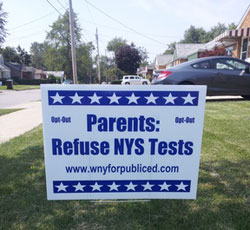Keep Initiative in Our Hands
• State Legislation Calls for Halting Common Core
• Amendments to S6604 Education Legislation for Consideration
• Failed Implementation, or Failed Governance? On the Possibility of a Common Core Moratorium • Upcoming March Events Defending the Right to Education
 Legislators from the New York State Senate and Assembly on February 12 introduced legislation to halt the Common Core State Standards for three years, with potential to scrap them altogether. The legislation in the Senate, S6604, calls for establishing a “Blue Ribbon Commission on 21st Century Testing and Curriculum.” The purpose given for the legislation states, the commission “Will be empowered to hold hearings, study, and make recommendations to the governor and legislature, regarding education issues related to Pre K-12 curriculum and testing in New York State. During the review, school districts shall not be required to implement the Common Core curriculum, nor shall any state test be based off of the Common Core standards. Upon completion of their review, the Commission shall take a vote to determine whether the Common Core curriculum shall be reinstated.”
Legislators from the New York State Senate and Assembly on February 12 introduced legislation to halt the Common Core State Standards for three years, with potential to scrap them altogether. The legislation in the Senate, S6604, calls for establishing a “Blue Ribbon Commission on 21st Century Testing and Curriculum.” The purpose given for the legislation states, the commission “Will be empowered to hold hearings, study, and make recommendations to the governor and legislature, regarding education issues related to Pre K-12 curriculum and testing in New York State. During the review, school districts shall not be required to implement the Common Core curriculum, nor shall any state test be based off of the Common Core standards. Upon completion of their review, the Commission shall take a vote to determine whether the Common Core curriculum shall be reinstated.”
The Commission is to hold public hearings and conduct studies on developing standards over a three-year period, from 2014-2016. By January 31, 2016 it is to issue a report on its findings and make recommendations on standards, their implementation and whether to scrap the Common Core. The legislation specifically states that during that three-year period the New York State Department of Education (NYSED) “shall be prohibited from requiring any school or school district in the state to issue a Common Core state test,” or “implement the Common Core curriculum,” until the 2016-17 school year. While this likely means use of the Common Core will be halted in New York if the legislation passes, it remains to be seen if the federal government will attempt to pressure some districts to proceed with use of the Common Core using bribes of federal funding. The Common Core was imposed in the first place with a federal bribe of $700 million to the state. School districts across the state are arleady finding that the funding required by to implement the Common Core curriculum and testing has already far surpassed whatever Race to the Top funds were received. It is also possible that forces like Bill Gates will offer funds to any district or school that persists in using Common Core. He has spent $1.5 billion already to get Common Core imposed nationwide and is liekly to continue to do so.
The legislation is in part a result of widespread opposition to the Common Core and its testing and teacher evaluation regime. From Long Island to Buffalo, in many meetings organized by parents and teachers themselves, as well as public hearings organized by elected representatives and Education Commissioner King, there has been overwhelming opposition to the Common Core. Using many facts and examples from their direct experience, parents and teachers together have shown that the Common Core regime is harmful to students and harmful to teaching and learning. This includes the fact that the increased testing and its use to evaluate teachers is literally making students sick, with doctors identifying the illness of “Common Core Syndrome.” The requirements to teach to the tests, give pre and post-tests and “benchmark” tests, and the “teaching modules” provided for this are narrowing the curriculum and eliminating the space for students and teachers alike to engage in investigation, discovery and various ways of learning and teaching. As well the materials are consistently developmentally inappropriate, with students often being tested at 1-2 grade-levels higher and curriculum that is harmful and not age-inappropriate.
The undemocratic character of imposing the Common Core, including the fact that the tests and the results are kept secret and developed by private monopolies has also been firmly opposed. The fact that parents and teachers are not the ones deciding and that elected bodies, like school boards and legislatures are also blocked from decision-making, has also been denounced. The Common Core was written on the basis of excluding parents and teachers and the public more generally and was adopted without votes by state and local legislatures. (see updates January 17 and December 20 for more).
The Commission is to hold at least one public hearing in each of the following regions: Long Island; New York City; Hudson Valley; Capital District; North Country; Central New York; Finger Lakes; Western New York; Southern Tier. Members of the public will be able to speak and the Commission can also compel testimony of witnesses and require production of documents.
 According to the legislation, “After review, study, and receipt of public comment, the commission shall issue a report and promulgate recommendations governing educational standards, curriculum, the implementation thereof, and testing in the state of New York for grades pre-kindergarten through twelve.” The Commission is to study state standards and related curriculum from 2009-10 and those of the Common Core established in 2010 by the National Governors Association and the Council of Chief State School Officers (two non-elected bodies). An analysis of best practices is to be done, comparing the two. Analysis and recommendations are to be made concerning:
According to the legislation, “After review, study, and receipt of public comment, the commission shall issue a report and promulgate recommendations governing educational standards, curriculum, the implementation thereof, and testing in the state of New York for grades pre-kindergarten through twelve.” The Commission is to study state standards and related curriculum from 2009-10 and those of the Common Core established in 2010 by the National Governors Association and the Council of Chief State School Officers (two non-elected bodies). An analysis of best practices is to be done, comparing the two. Analysis and recommendations are to be made concerning:
• age appropriate and developmentally appropriate means of implementing and transitioning to new educational standards and curriculums within the state;
• the time and resources spent preparing for and administering state-wide tests within the state, for each grade, in the school years 2009-10, 2010-11, 2011-12, 2012-13, 2013-14;
• the impact that the time and resources allocated had on the quality of instruction and emotional well-being of students in the state;
• the impact that a change in curriculum will have on students who are absent from their regular classes for extended periods each week due to receiving special educational services, remedial services, or students who have extended absences;
• how the potential reinstatement of the Common Core curriculum will impact the amount of time that students of various family structures and socio-economic backgrounds spend doing homework;
• the sufficiency of the Common Core [teaching] modules and any lesson plans provided to the schools by the department;
• a comparison of locally developed curriculums that were developed in order to instruct on the Common Core standards and those that were purchased from vendors, with a focus on quality, age appropriateness and developmental appropriateness;
• whether or not instruction and testing on the Common Core curriculum is developmentally appropriate for children with individualized education plans and children with other learning disabilities.
The law states: “After concluding their study, the commission must take a vote on whether or not they believe the Common Core curriculum should be reinstated. The results of that vote must be included in their final report.” The Commission itself has no enforcement powers, rather it makes recommendations to the legislature, which would then consider additional actions to take.
While the legislation recognizes the need for more public hearings, it also reflects the current undemocratic trend for decision-making to be made by executives. It calls for a 23-person Commission to be appointed. Student organizations, such as those at the High School level, are given no place, although they are clearly one of the collectives most impacted.
The Governor appoints 5 members and leaders of the State Assembly and Senate two each, with a total of 8. This means these executives appoint 13 people, a majority of the Commission. There are no qualifications given for the people appointed so no guarantee they will include teachers, librarians, staff, parents, or students.
As well, the president or executive director of the School Administrators Association, NY State Council of Superintendents, NY State School Boards Association, NY State Association of Independent Schools and NY State Association of Psychologists each appoint one member — a total of five.
In addition, the New York State United Teachers (NYSUT) appoints three members. One must have completed Special Education Certification and one must be an English as a Second Language teacher. President of the Statewide Parent Teacher Association appoints two members, with one being a parent of a student with a current individual education plan.
The legislation was introduced and referred to the Senate Education Committee, which must vote on it before it is brought to the floor of the Senate. Similar legislation is to be introduced in the Assembly in the coming week.
[TOP]
Amendments to S6604 Education Legislation for Consideration
 New York State legislators recently submitted education legislation, S6604 calling to halt the Common Core curriculum and testing for three years (see article above). If passed, it would establish a Blue Ribbon Commission to analyze and study the issue of public education standards. Specifically it is tasked with studying and comparing state standards and related curriculum from 2009-10 and those of the Common Core. The Commission is to then make recommendations to the legislature, including whether the Common Core should be scrapped.
New York State legislators recently submitted education legislation, S6604 calling to halt the Common Core curriculum and testing for three years (see article above). If passed, it would establish a Blue Ribbon Commission to analyze and study the issue of public education standards. Specifically it is tasked with studying and comparing state standards and related curriculum from 2009-10 and those of the Common Core. The Commission is to then make recommendations to the legislature, including whether the Common Core should be scrapped.
The Commission would be required to hold at least one public hearing in nine regions across the state, including Western New York. Along with comparing standards from 2009-10 and the Core, one of its specific tasks is “a comparison of locally developed curriculums that were developed in order to instruct on the Common Core standards and those that were purchased from vendors, with a focus on quality, age appropriateness and developmental appropriateness.”
Many people now organizing to oppose the Common Core are supporting the legislation, while also speaking to its limitations — such as not addressing the increasing role of the federal government in public education, the takeover of public education by private interests, and the lack of decision making by the public on this urgent social matter. The support stems in part because the legislation goes beyond current calls to have a moratorium on the consequences of the testing, to actually calling for a halt to the testing itself and to use of the Common Core curriculum for three years, and for potentially scrapping it altogether. It reflects to a certain extent the public stand that the problems with the Common Core are not problems of implementation but rather one of the Common Core itself.
One of the questions being raised is whether this halt will serve to deprive the current movement against the Core and for improving public education of its drive and momentum? That depends in part on whether the movement continues to keep the initiative in its own hands or turns it over to the politicians.
One main way to keep the initiative is to increase the independent work now being done by various organizations to oppose the Common Core and the entire agenda of the private monopolies to wreck public education — and to elaborate our own alternative based on defending the right to public education and raising its quality. We keep matters in our own hands by not being limited to the arena of legislation, while also using that arena to our advantage.
In this spirit we suggest the following possible amendments to S.6604 as a means to increase the role of the public in decision making during this three-year period. We also suggest that whether such amendments are accepted, that all together continue to pursue public meetings along the lines suggested at local, regional and state levels:
1) That the Commission be required to hold at least one public meeting in each of the regions EACH YEAR, in 2014, 2015 and 2016. That the 2015 public meetings focus on taking testimony and receiving briefs on the fundamental issues of poverty, school funding and racism as necessary to raise the quality of education and establish standards. And the 2016 meetings focus on examining curriculum and standards developed locally and/or regionally;
2) That Commission members also be required to accept invitations to attend public meetings organized by parents, teachers and organizations defending public education and that funding be provided to the public for such meetings;
3) That along with reviewing local curriculum developed for the Common Core, local curriculum designed by teachers, staff, parents and students be given a public space for discussion (such as the 2016 public meetings) and serious consideration as alternatives. The Commission should encourage and facilitate development of such alternatives.
4) Before giving its recommendations on whether to scrap the Common Core, the Commission be given the means to organize district-wide and statewide referenda so the public can also vote on whether to scrap Common Core.
[TOP]
Failed Implementation, or Failed Governance?
On the Possibility of a Common Core Moratorium
 Many are now discussing the possibility of a moratorium on the Common Core in New York State. This possibility poses significant questions that should be pursued.
Many are now discussing the possibility of a moratorium on the Common Core in New York State. This possibility poses significant questions that should be pursued.
The key question to start with is, how should such a proposal be evaluated? How are members of the public and professional educators to determine whether or not the moratorium is a Trojan horse or if it is a space to broaden the discussion about what education policy is required in New York State, enabling the public to have a say?
How might parents, teachers and community members influence a moratorium so that it serves the public good?
Will a moratorium serve to expand the space for the public to operate, to develop and exercise its authority over the purpose of public schools? Will it serve to strengthen the work and standing of professional educators? Will it bring parents, educators and their communities closer together, working in concert to develop and together realize a vision of the common good through education work?
Will it allow for communities to put the real, serious and growing problems of poverty, school funding and racism on the agenda?
While Governor Cuomo’s Common Core review panel has already been exposed as a fraud, the move in the state Senate and Assembly to enact a moratorium on the implementation of the Common Core warrants careful consideration.
To that end, I offer the following observations.
I like to begin with definitions. They discipline and calm the analysis. So, what does “moratorium” mean? Derived from the Latin for delay, a moratorium is, “a temporary prohibition of an activity,” with my dictionary offering this example: “an indefinite moratorium on the use of drift nets.” In law, it refers to “a legal authorization to debtors to postpone payment.”
And what about implementation? Much of the focus in the media and among some educators has been with respect to the implementation of the Core regime. It is defined as “the process of putting a decision or plan into effect; execution: she was responsible for the implementation of the plan.”
The notion of moratorium thus contains the idea that, in the end, the thing now being delayed will eventually be resumed. That is to say, to propose a moratorium on implementation of the Core regime is to assume that it should continue, but only at some future point. I don’t think such a conclusion reflects existing public opinion. I think people want an honest and through evaluation of the regime’s elements, with the understanding that such a review might lead to the conclusion that the Core regime be rejected in its entirety.
The notion of implementation is even more significant. By focusing on implementation, the question of who decides is ignored. Focus is turned instead to those directed to follow orders. Directing all of one’s energy at the Commissioner or even the Regents might lead us to miss other key elements of the “reform” agenda, including an examination of who is driving the actions of King and the Regents. It must be understood that their actions are the result of a much larger movement. Replacing them will likely not be enough to stem the tide of “reform”.
 For example, it is widely known that there are other, larger forces acting in concert, such as the secret and not publicly accountable Regents’ Fellows, and beyond that, the huge foundations controlled by the likes of Bill Gates and Eli Broad, not to mention Achieve, Inc, and Pearson, and many more corporate interests. It is well known that absent such forces, and absent Race to the Top money, there would be no King, or Regents Fellows; and there would be no test-based teacher evaluation, no Core standards or Core tests.
For example, it is widely known that there are other, larger forces acting in concert, such as the secret and not publicly accountable Regents’ Fellows, and beyond that, the huge foundations controlled by the likes of Bill Gates and Eli Broad, not to mention Achieve, Inc, and Pearson, and many more corporate interests. It is well known that absent such forces, and absent Race to the Top money, there would be no King, or Regents Fellows; and there would be no test-based teacher evaluation, no Core standards or Core tests.
Thus, a focus on implementation assumes that the decision making processes are not to be evaluated as part of a moratorium on the Common Core. In so doing, the public is being redirected to focus only on the implementation of decisions already made, largely in secret. The public is being directed to instead focus narrowly on those doing the implementing. Here, it is important to understand that this even includes the New York State Department of Education, in addition to superintendents, school boards, and union contract negotiators.
Maybe the problem does not originate as a problem of “poor implementation.” If the observable situation points to flawed implementation all down the line and at nearly every step of the way, with no shortage of evidence from across the state, one has to pause and consider the possibility that extensive problems related to implementation signify that the policy itself is fundamentally flawed. You can’t do a wrong thing more right. If its killing all the patients, its probably not doctor error.
And what appears to be at the center of the current “wrong thing” is the manner in which the governance of education has been centralized and privatized, with public schools transformed into the play thing of the super-rich. The public should not be shocked that decisions aimed narrowly at maximizing profits and labor control, decisions made by non-educator hedge-fund managers and corporate CEOs in far-away corporate headquarters, cause trouble when implemented.
Thus, I offer this thesis: systematic failure of implementation suggests that the problem is not only with the policy itself, but with the way in which the education system is now governed. What if the difficulties we now find ourselves facing are really a result of the decision making process itself, and who is involved, and who is excluded? What if what we’re experiencing is not a failure of implementation, but a failure of governance?
I propose that any government body, committee, panel or Blue Ribbon Commission, be directed to address public concerns about the Core regime by answering, in detail, the following questions:
How did existing authorities in Albany and NYSED come to make decisions for the public that have so systematically caused it harm?
How are those responsible to lead education in New York State currently selected — The Regents, the Commissioner — and how can that process be changed to better reflect the public will?
What mechanisms are in place to check the power of and hold accountable private foundations and corporate interests involved in educational decision-making in New York State, including the Regents’ Fellows; what oversight of private foundation influence currently exists, and how does it operate?
Did New York State legislators or state officials evaluate the legality of the federal Race to the Top (Rtt) and USDOE wavier programs prior to signing on to state applications for RttT grants and NCLB waivers? What was the nature and scope of any review and to whom was it reported?
What action should be taken should it be found that such policies violate state or federal law, especially with respect to violations of the legal standing of Local Educational Authorities in New York State?
What resources will be provided by the state to communities to empower them to broaden the public discussion about public education and what mechanisms will be developed to further involve parents, educators and members of the local community in ensuring that they are no longer excluded from decision making about their public schools.
If parents, educators and their communities were involved from the beginning in determining what was needed for public schools, would we be in the current situation? Would we see developmentally inappropriate standards, narrow, unreliable and invalid tests for students and teachers, violations of privacy rights and the overall cheapening of public education? I doubt it.
The point is this: its not about the standards, its about who controls them, who makes them, who enforces them. Fights over standards are really fights over who de cides. That is the question any moratorium worthy of the public interest must consider. Because if the Core is defeated, yet the public remains excluded, you can bet Bill Gate’s tax exceptions another hair brained reform will soon follow in its wake.
[TOP]
WNYers for Public Education presents
The Truth About Common Core, Testing, and Data Sharing:
Why Parents Are Opting Out
Panel Discussion with small group breakout sessions to follow
 Saturday March 1, 2-4pm
Saturday March 1, 2-4pm
University at Buffalo, South Campus, 105 Harriman Hall
Parents empowering parents! Have you noticed changes in your child's education? Are you confused about reports from the media and how it is impacting your child's classroom experience? What is Common Core, high-stakes testing, data sharing, and opt-out all about? What is fact and what is myth? Join an expert panel of parents and educators on these issues to help you decide how to guide your child through education reforms and resistance.
* * *
Rally to Defend the Right to Education
and Demand Full Funding Now
 March 7, 6:30 p.m. rain or shine
March 7, 6:30 p.m. rain or shine
Niagara Square, Buffalo
Rallying for:
• Saving arts, music, AP courses, foreign languages, afterschool programs, kindergarten, student support services, and a love of learning.
• Demadning Investments of $1.9 billion in New York Public Schools K-20
Sponsored by NYSUT
* * *
League of Women Voters Presents:
Learning More About the Common Core
Wednesday, March 12, 7-9pm
Unitarian Universalist Church, 695 Elmwood, Buffalo
Keynote Speaker: Dr. Mark Garrison
Areas of Discussion for Panel of Speakers:
Origin of Common Core, Relation to No Child Left Behind and Race to the Top, testing, privacy concerns (inBloom) and implementation. Q&A to follow panel
[TOP]
